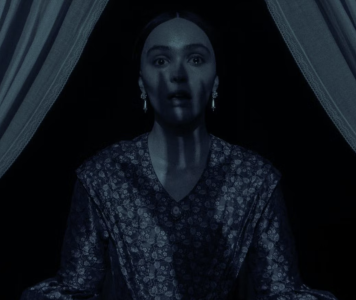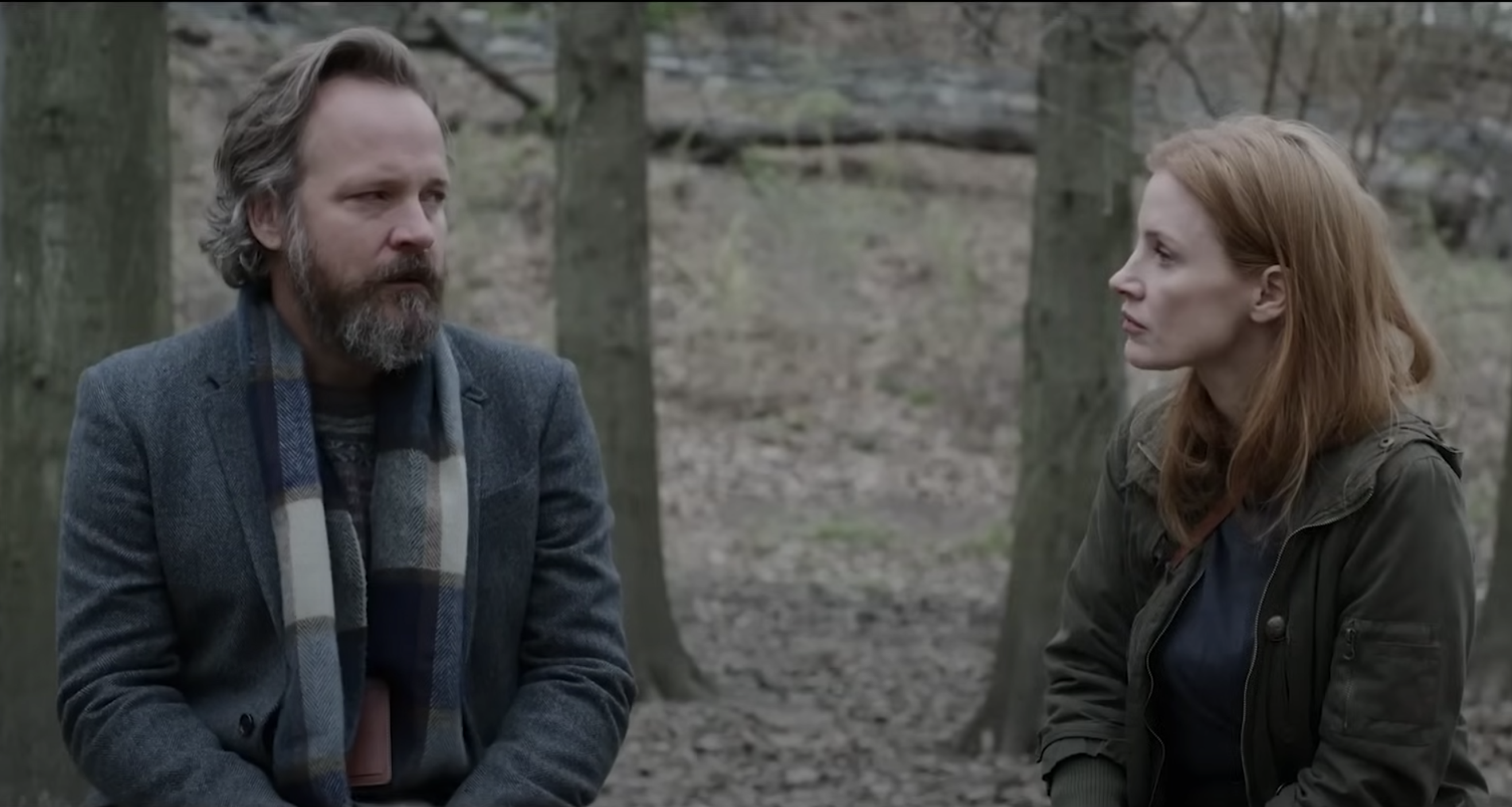James Carville at 5:27 mark: “Republican Speaker of the House] Mike Johnson and what he believes is one of the greatest threats you have today to the United States. [Christian nationalism] is a bigger threat than Al-Queda. They’re funded, and they’re relentless, and they probably won’t win for a while, but they might. They don’t believe in the Constitution. They’ll tell you that. Mike Johnson himself says, what is democracy but two wolves and a lamb deciding what to have for dinner That’s what they really, really believe.”
 Jeff Wells
Jeff Wells
“Memory”: Mature, Absorbing, Not Half Bad
You go into a Michel Franco film (New Order and Sundown are recent HE favorites) with an understanding that dysfunction, severity and obsession will be served, and that some kind of rug will be be pulled out at some point. Franco doesn’t traffic in compassion and heartfelt currents as a general tendency; he does radical and harsh.
But that’s what I like or at least respect about Franco. He keeps the viewer on edge, and therein lies the tension.
So I was surprised when I saw Memory the other night and began to realize that it would be dealing the cards without the usual “uh-oh…when will the ferocious stuff happen?”
It’s basically a kind of strange-but-tender relationship thing…an acting-exercise drama about two damaged 40somethings — Jessica Chastain‘s Sylvia and Peter Sarsgaard‘s Saul — who probably shouldn’t get too deeply involved with each other because they have turbulent histories and are both too fucked up…Saul especially.
Memory is set in Brooklyn and you can really feel those down-in-the-weeds Brooklyn vibes. It settles into two families for the most part, and nobody’s really happy or steady or swingin’ from a star.
But the acting is so good and true…I felt immediately held and fascinated. I’m trying to think of the last time I saw a sexual relationship drama that had me thinking “wow, this might not end well and neither party seems to understand that…in fact it might end really badly.”
And yet things…I won’t say but this is easily the gentlest Franco film I’ve ever seen.
Sylvia is a cautious and brittle mom who works at an adult daycare center (a gathering of bruised and traumatized types) while raising the teenaged Anna (Brooke Timber).
Sylvia is wary of whatever might be around the corner, and so naturally she gradually gets involved — at first guardedly and tentatively, with Saul, who is clearly a bit weird but not dangerously so — a gentle, socially awkard beardo who’s plagued by some kind of dementia, and can’t seem to remember anything from the past.
Right away you’re wondering what semi-responsible woman (particularly one with a troubled parental and sexual history) would let this guy into her life?
The bottom line is that Chastain and Sarsgaard are quite the penetrators and dig-deepers, and for this reason alone Memory (Ketchup Entertainment, 12.22) is worth a watch.
Question: Why would a film distributor call itself Ketchup Entertainment? What if a similar operation called itself Mayonnaise Distribution? Or Miracle Whip Ltd.? Or Steak Sauce International? Or the Mustard Brothers?

Life is A Comedy, Written By A Sadist
Amazing news! Hollywood Elsewhere is a sudden, overjoyed victim of something that looks and feels like Bell’s Palsy.
All to say that this morning (six hours ago) I realized that the right side of my face had more or less frozen. I can’t smile on my right side — my upper lip just lies there like a limp prosthetic. If I sip coffee the coffee dribbles out of the right side of my mouth. I look like a guy in a Francis Bacon painting, or like Quasimodo. Plus my drooping right eye won’t completely close (no blinking to speak of) and won’t stop watering.**
If I can’t fix this my days of looking like a moderately attractive fellow are fucking OVER, man.
I tried my primary care physician and she told me to go Urgent Care, which isn’t going to remedy anything. I have an appointment with a facial paralysis specialist in Stamford early Monday morning, but Tatiana, who grappled with Bell’s Palsy seven or eight years ago, says I need to do something about this immediately as this condition can quickly degenerate. So I’ll take my computer along and post reactions to the NYFCC winners as things move along.
** I’m praying to God this is a temporary thing that will heal itself or otherwise go away.
Yesterday afternoon I was trying to get an imperfect lower-jaw veneer to fit correctly, and I pushed down upon it hard, which may have resulted in my natural teeth pushing down on facial nerves.
Update: The Urgent Care physican says it’s Bell’s Palsy, but a mild case of it. It’ll gradually go away, he says.
Bell’s palsy, defined as an acute peripheral facial weakness of unknown cause, has an annual incidence of 20 to 32 per 100,000. Most patients recover completely, with or without treatment, but 20% to 30% can have permanent facial weakness or paralysis.
Website: “A 10-day course of corticosteroids (prednisolone 25 mg., twice daily) started within 72 hours significantly improves the chances of complete recovery.”
All Hail Da’Vine Joy Randolph’s NYFCC Win!
Herewith are the final choices of the New York Film Critics Circle, which were voted on earlier today. HE strongly agrees with one judgment — the Best Supporting Actress prize going to The Holdovers‘ Da’Vine Joy Randolph. And Oppenheimer‘s Chris Nolan winning the Best Director award…fine. And some of the minor category awards were acceptable. But I responded to other major-category NYFCC winners with puzzlement and annoyance.
Best Film: Killers of the Flower Moon (Apple Original Films/Paramount Pictures) / HE reaction: On its own dramatic terms, Martin Scorsese‘s sprawling, guilt-trip period drama is moderately approvable, at best, and is certainly a bear to sit through. (I’ve seen it twice.) It seems obvious that the NYFCC gave it their top prize for reasons and motives that sidestep cinematic principles. (A critic friend believes it may be Scorsese’s worst film ever). KOTFM was chosen as a gesture of support and compassion for the Oklahoma Osage in particular and victims of white avarice and greed in general. What should have won? Obviously Poor Things, Maestro, Oppenheimer, American Fiction, The Holdovers….hell, even Barbie is more deserving of a Best Picture trophy than Killers.
Best Director: Christopher Nolan, Oppenheimer (Universal Pictures) / HE reaction: Okay, no argument, good enough.
Best Actor: Franz Rogowski in Passages (Mubi) / HE reaction: What happened here? A plurality of NYFCC voters actually believe that Rogowski, an aggressively intense and deeply unappealing actor (I stopped watching Passages because of him)…the NYFCC congregation is honestly contending that Rogowski out-points the brilliant triumvirate of Bradley Cooper in Maestro, Paul Giamatti in The Holdovers and Jeffrey Wright in American Fiction? This is nutso.
Best Actress: Lily Gladstone, Killers of the Flower Moon (Apple Original Films/Paramount Pictures) / HE reaction: I’ve been saying all along that the Gladstone bandwagon is an identity thing….”let’s all celebrate a moderately okay performance by a Native American actress because she’s a Native American actress.” Her Mollie Burkhart delivers a certain simmering, accusatory undertow but she has no great scenes or or even distinctive ones — everything Gladstone puts out is subdued, restrained and a bit flat. The NYFCC voters acquiesced. Who should gave won?: Obviously Poor Things‘ Emma Stone or Maestro‘s Carey Mulligan — performances that reach big-time and rank far above and beyond.
Best Supporting Actor: May December‘s Charles Melton (Netflix) / HE reaction: I’m mystified by this. Melton is fine in May December, but what is this? What’s going on? Is it because he’s good looking and half-Korean or something? I actually felt that his performance was a little on the slightly weird, less-than-assured, flailing-around side.
Best Supporting Actress: Da’Vine Joy Randolph, The Holdovers (Focus Features) / HE reaction: Excellent call, emphatic agreement, best of the bunch.
Best Screenplay: May December (Netflix — Samy Burch, Alex Mechanik / HE comment: This is a completely deranged call. David Hemingson‘s The Holdovers script is way, way above the shooting-fish-in-a -barrel level of the campy May December…who’s kidding who here?
Best Animated Film: The Boy and the Heron (GKids) / HE comment: No comment.
Best Cinematography: Hoyte van Hoytema for Oppenheimer (Universal Pictures) / HE comment: No worries.
Best First Film: Past Lives (A24) — dir. Celine Song / HE comment: Fair enough.
Best International: Anatomy of a Fall (Neon) — dir. Justine Triet / HE comment: The Taste of Things is a far richer andf more enjoytable film.
Best Non-Fiction Film: Menus-Plaisirs-Les Troisgros (Zipporah Films) — dir. Frederick Wiseman.
The NYFCC are mostly ideological sycophants, political cowards, go-alongers…people who have sworn loyalty to the politically purifying, disruptive, anti-populist social serum that’s been plaguing cinema since ’17 or thereabouts…basically your Strelnikovs, your enlightened cool kidz…advocates of dynamic social change first and movie worship second.
Don’t Forget What The NYFCC Has Turned Into
…and the damp-finger-to-the-wind submission to woke terror that many NYFCC members live by or adhere to. For roughly five years now, they’ve been leading the DEI insanity charge up San Juan Hill…”charrrrrrge!”
Posted on 1.9.23, or not quite 11 months ago: In addition to their sometimes well-grounded, highly perceptive praising of stellar filmmaking and performances, the New York Film Critics Circle has (be honest) been in the grip of woke theology over the last four or five years. Most of us understand this, and the NYFCC honchos and spokespersons will deny it to their dying day.
For decades a NYFCC award was a gold-standard honor — a classy, triple-A stamp of irrefutable big-city approval. But since ’18 or thereabouts the NYFCC members have sought to integrate notions of quality with “the sacralization of racial, gender and sexual [identity],” as Matthew Goodwin put it in February 2021. In short, they’ve become known as a contender for the most reliably eccentric, woke-flakey critics group, neck and neck with the occasionally wokejobby Los Angeles Film Critics Association.
(Note: HE has agreed on certain occasions with LAFCA award calls, hence the term “occasionally woke-jobby.”)
For me the syndrome seemed to begin in 2018 when the NYFCC handed their Best Actress award to Support The Girls‘ Regina Hall. For me there was no contest among the Best Actress contenders that year — Melissa McCarthy‘s performance in Can you Ever Forgive Me? was heads and shoulders above Hall’s, and yet the NYFCC allowed themselves to be guided by identity politics. They disputed this, of course.
Former IndieWire guy Eric Kohn, a leader of the NYFCC’s Hall support group: “There is no groupthink to the NYFCC voting process. The rules are right there on the site. Nobody’s ‘using’ any single award for their private agenda.”
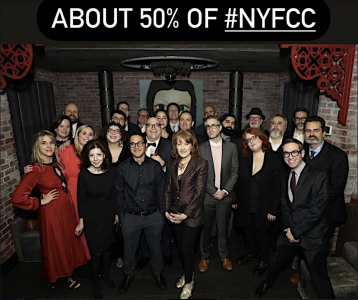
The following year the NYFCC handed their Best Actress trophy to Us‘s Lupita Nyong’o for no apparent reason other than her woke identity credentials. Posted on 12.14.19: “Seriously? Honoring Lupita Nyong’o’s performance was eight parts wokester virtue-signalling, and two parts serious regard for a noteworthy performance…trust me. The NYFCC used to be the NYFCC — now it’s an organizational ally of IndieWire‘s wokeness crusade. Good as she was in Jordan Peele’s interesting if underwhelming horror flick, Lupita basically delivered an intelligent, first-rate, Jamie Lee Curtis-level scream-queen performance with a side order of raspy-voiced predator doppleganger.”
HE believes that the NYFCC’s grand-slam wackadoodle happened in 2020, when they gave their Best Film award to Kelly Reichart‘s First Cow (a baffling, eccentric call for eccentricity’s sake), and their Best Actor prize to Da 5 Blood‘s Delroy Lindo, who played an furiously unstable Trump supporter (and in so doing beat out Judas And The Black Messiah‘s Lakeith Stanfield, who was far more deserving, not to mention The Father‘s Anthony Hopkins, Minari‘s Steven Yeun, The Sound of Metal‘s Riz Ahmed and Mank‘s…okay, let’s forget Gary Oldman).
Plus their Best Actress award went to Sidney Flanigan (Never Rarely Sometimes Always), basically for quietly weeping during an interview with a Manhattan-based abortion counselor after zero emoting throughout the entire film. They also gave their Best Supporting Actor award to Da 5 Bloods‘ Chadwick Boseman, basically because the poor guy had tragically passed a few months earlier, and their Best Supporting Actress: trophy to Maria Bakalova (Borat Subsequent Moviefilm), which was based upon nothing other than the fact that she played a spunky woman from a small Eastern European village who wound up hoodwinking Rudy Giuliani in a hotel room.
How wackadoodle were their 2022 choices? I for one was…I was about to say flabbergasted when the NYFCC handed their Best Director award to RRR‘s S. S. Rajamouli — a virtue-signalling gesture if there ever was one, and a head-scratching accolade for a film that many of us regard as “flamboyant garbage…ludicrous, primitive crap that believes in ridiculous extremes and heroic absurdities.” But I wasn’t surprised given what the NYFCC has turned into. They also went for Everything Everywhere All At Once‘s Ke Huy Quan (“Short Round”) for Best Supporting Actor — strictly an identity call + a nod to the popularity of EEAAO among Millennials and Zoomers — and Nope‘s Keke Palmer for Best Supporting Actress…an award that made no sense as all given that Palmer merely flaunted her Millennial diva spunkitude.
On The Beach
A chat with No Country for Old Men co-director and co-writer Ethan Coen at a Miramax press luncheon — Sunday, 5.20.07, 1:55 pm:
HE to Ethan: “The only speed bump for mainstream audiences in No Country for Old Men, as you know, is your decision to not allow audiences to share in Josh Brolin‘s final fate, as it were.”
Ethan to HE: “And that’s a perverse decision, isn’t it?”
HE: “Well, that’s one of the things that give the film artistic authority and distinction, and it either makes people respect it or…”
Ethan: “Or dislike it.”

HE: “Well, we all know that there’s a certain expectation [out there], that when you’ve spent the entire movie with a guy, you wanna…but for me, this is what makes the film extra-special.”
Ethan: “And for us too. I mean, it’s just from the novel and [garbled]. But when you get to this point you say, ‘Okay, the movie’s not ultimately about this guy…so what is it about?'”
HE: “About the end of the world, about the good old stuff really coming to an end, about being engulfed by waste and annihilation.”
Ethan: “Uh-huh!”
Newsom-DeSantis
Every HE regular who has instinctually, blithely and thoughtlessly dismissed Gavin Newsom as a credible presidential contender. Tomorrow night’s debate between Newsom and Gov. Ron DeSantis (who is wasting his time running for the Republican presidential nomination) will almost certainly be an eye-opener. We all understand that President Joe Biden hasn’t the stamina or quickness of mind to match Newsom’s debating skills. It’s a fact.
Worst Death-Depiction Scene in Cinema History
Tens of millions of serious movie fans swear by No Country For Old Men (’07), and I’ll bet there are less than 25 humans in the entire cinematic universe who approve of Joel and Ethan Coen’s non-depiction of the death of Llewelyn Moss (Josh Brolin).
Yes, this is how Moss’s shooting death was handled in Cormac McCarthy’s novel– the Coen’s were simply being loyal to McCarthy’s dramatic choice. The difference, of course, was that McCarthy could easily convey what happened to the reader but in the film it isn’t clear that it’s Brolin lying on that motel-carpet rug. No matter how you slice it, it’s a huge cheat….a WTF! for the ages.
This aside, here’s a repost of “Dying With Style,” which appeared on 9.30.20 — smack dab in the soul-suffocating depths of the pandemic:
Yesterday (9.29) Widescreen‘s Anthony Francis posted on Facebook about some of his favorite death scenes.
1. Marlon Brando‘s hacking cough death in Act Three of The Godfather (’72). Francis comment: “The man dies a monster — a mirror image of his true self.” HE comment: Vito Corleone does not “die as a monster” but as a kindly, animated old guy playing with his grandson. The scene in which Vito scares young Anthony by putting a piece of orange skin in his mouth is one of the most heartwarming moments in American cinema.
2. Christopher Walken shoots himself in the head in The Deer Hunter (’78). Francis comment: “One shot and with a smile, [Walken] becomes another casualty of war.” HE comment: I hated Cimino’s idiotic Russian roulette gimmick from the get-go, and have always refused to read anything into it. No lead character in a serious film has ever died for a dumber reason than Walken did in The Deer Hunter. Which I haven’t seen, by the way, since ’78 or thereabouts.”
3. John Hurt chest-burst death in Alien (’79). Francis comment: “The death that shocked audiences all over the world.” HE comment: Well, okay but people weren’t reacting to Hurt’s death as much as the realistic physical effects that made the chest-fever scene seem so vivid and traumatic. It wasn’t a death thing but a ‘holy shit, how did they do that?'”
4. Rutger Hauer‘s wings-of-a-dove death scene in Blade Runner (’82). Francis comment: “All those moments will be lost in time like tears…in the rain. Time…to die.” HE comment: “One of the saddest, gentlest and most beautiful death scenes in movie history.”
5. Josh Brolin‘s off-screen death in No Country For Old Men (’07). HE comment: “One of the strangest directorial cheats of all time…almost on a fuck-you level…you spend a whole film with a guy and then he gets blown away by some crazy Mexicans and we don’t get to witness it in real time?”
6. James Cagney‘s blown-to-kingdom-come death in Raoul Walsh‘s White Heat (’49). HE comment: “Better to go out with a big glorious bang than whimpering and anesthetized inside some padded cell.”
7. A lovesick, house-sized ape plummets 86 stories to his death in King Kong (’33). HE comment: “20 or 30 seconds before he lets go and falls there’s an expression on Kong’s face as he looks up at the planes. The look says “you fucking assholes…I’m in love and all you want to do is kill me…you’re such pricks, all of you…why didn’t you just leave me alone with Faye Wray back on the island? I would’ve taken care of her.”
8. Each and every electric-chair death in The Green Mile elicits HE contempt. As God is my witness I’ll never see that godawful film again.
9. William Holden‘s pointless and easily avoidable death in Sunset Boulevard. HE comment: Joe Gillis knows that Norma Desmond tends to react over-dramatically about everything, and he knows that she’s obsessively in love with him, and that the odds of her doing something rash if he announces he’s leaving her are high. If Gillis was smart he’d play it cool, leave her a sensible note, take the nice wardrobe and escape while she’s sleeping. And then go to the cops and say, “There’s an eccentric wealthy woman who may do something violent.”
Stuff That Cars Had In Bygone Days
…and which will never manifest again. CD and cassette players are gone forever…obviously. No more ashtrays…no problem. No more triangular vents at the front of the driver’s side and front passsenger windows, which were great for flicking ashes out of. Large backseat areas that offered ample leg room…gone and too bad.
But the yesteryear perk that I’m truly sorry has disappeared are those old, padded, well-upholstered, couch-like seats with the mohair velvet seat coverings. And the soothing old car aroma that resulted. (Which was occasionally mixed with the after-aroma of pipe or cigar smoke.) I’m talking about a grandfather-car aroma that I vaguely recall from way back. I visited a classic car show in Long Beach in the late ’80s or early ’90s — I might remember it from that.
Classic car buffs know what I’m talking about. It’s an entire culture unto itself.
I’ve never once sat in, much less driven, a 1920s-era Stutz Bearcat or anything resembling that swanky Norman Desmond car from Sunset Boulevard (a 1929 Isotta Fraschini — ee-ZOH-tah frah-SKEE-nee for morons), and I probably never will be. The luxury levels back then (i.e., Mollie Burkhart‘s era) were off the charts.
Car interiors have been almost all plastic and cheap metal for the last…what, 50 or 60 years? The padding in dashboards and trim is most commonly polyurethane foam, while the surface can be a mix of polyvinyl chloride and thermoplastic olefin. The most common plastic in cars is polypropylene, “a highly durable polymer produced from propylene.”
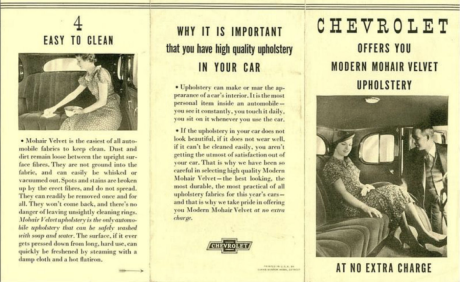
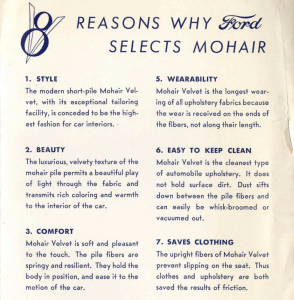
They Messed With Mollie
I’ve been complaining all along that Killers of the Flower Moon doesn’t deliver a satisfying catharsis in the matter of Lily Gladstone‘s Mollie Burkhart character. She never slaps or even scolds her slow-on-the-pickup husband Ernest, (Leonardo DiCaprio) after learning he’d injected her with poison. And she never says boo to arch-villain William Hale (Robert DeNiro) for his complicity in murdering various Osage brethren.
This photo suggests that if push ever came to shove, the stout Mollie could have easily beaten Hale up (she’s almost twice his size) and could even give Ernest a bruise or a black eye or at least give as good as she gets in a wrestling match. The skillfully manipulative Scorsese never allowed viewers to contemplate Mollie’s size advantage, of course.
But if I’d been in Marty’s shoes, I would have insisted on a Mississippi Burning-style payoff in which Mollie gets Hale in a headlock and forces a confession. Or maybe just slaps him around for pleasure. You can call this a crude Charles Bronson scenario, but the heart wants what it wants. The heart of Joe Popcorn. I mean.
Remember Little Big Horn!

When Will I Be Loved?
Or at least, you know, treated more fairly and respectfully?
Unless you subscribe to the extreme view that Robert DeNiro is an unreliable or unhinged narrator (which I doubt), there seemed to be an element of doubt or suspicion in that month-old financial grievance lawsuit with former employee Graham Chase Robinson. On the plaintiff’s part, I mean.
I’m presuming that DeNiro treated Robinson with insufficient respect or a lack of sensitivity from time to time, but many bosses are guilty of this. Not all but many. But you take your lumps and move on.
The term “abuse” or “abusive behavior” is thrown about fairly liberally these days. By today’s Millennial or Zoomer snowflake standards, it’s a very rare exception to the rule when a wealthy boss (celebrated or otherwise) doesn’t treat his or her veteran assistant with a certain degree of disregard or callousness. It’s not a desirable state of affairs, but it does seem to go with the rough and tumble.
By typical wokester sensitivity standards I, Jeffrey Wells, have been abused my whole life in one way or another, starting with my ostensibly brutal parents (when I was young I used to carry on internal debates about which one, mom or dad, was worse) and brusque grade school teachers and moving on from there. I’m not being facetious. I have been. I have the emotional scars and bruises to prove it.
On the other hand once you adopt the Everly Bros. or Linda Ronstadt attitude of “I’ve been cheated, been mistreated…I’ve been put down, I’ve been turned ‘round,” there’s no end to it.
Life is often abusive or hurtful in one way or another, at least to some degree. Do I wish that “abuse” was never visited upon poor poor pitiful me? Yes, I do wish that, but what else is new?
What Can Eggers Possibly Do With This?
Another Nosferatu/Orlok/Dracula yarn? Again? How many have there been?
The original 1922 F.W. Murnau film with Max Schreck as Count Orlok. Tod Browning‘s Dracula (’31). Those Hammer Dracula films of the ’50s and ’60s with Christopher Lee and Peter Cushing. Followed by Werner Herzog‘s Nosferatu the Vampyre (’79), Francis Coppola‘s Dracula (’92) and E. Elias Merhige‘s Shadow of the Vampire (’00) with Willem Dafoe as Max Schreck himself. What am I forgetting?
Robert Eggers‘ Nosferatu will open theatrically on 12.25.24.
But technique aside, what could Eggers be expected to add to the lore? The saga has been beaten to death, and Eggers, it’s fair to say, suffered his first semi-failure when he released The Northman in April ’22. If Nosferatu works, it’ll almost be considered a comeback.
Eggers’ film costars Nicholas Hoult, Lily-Rose Depp, Aaron Taylor-Johnson, Emma Corrin, Willem Dafoe and Simon McBurney.
